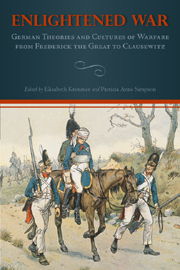Book contents
- Frontmatter
- Contents
- List of Illustrations
- Acknowledgments
- Introduction: Enlightened Warfare in Eighteenth-Century Germany
- Part I War and Enlightenment
- Part II Cultures of War in Classicism and Romanticism
- Part III War and Gender
- 7 On Gender Wars and Amazons: Therese Huber on Terror and Revolution
- 8 Angelica Kauffmann's War Heroes: (Not) Painting War in a Culture of Sensibility
- 9 Citizen-Soldiers: General Conscription in the Nineteenth and Twentieth Centuries
- Part IV War and Theory
- Bibliography
- Notes on the Contributors
- Index
9 - Citizen-Soldiers: General Conscription in the Nineteenth and Twentieth Centuries
from Part III - War and Gender
Published online by Cambridge University Press: 05 February 2013
- Frontmatter
- Contents
- List of Illustrations
- Acknowledgments
- Introduction: Enlightened Warfare in Eighteenth-Century Germany
- Part I War and Enlightenment
- Part II Cultures of War in Classicism and Romanticism
- Part III War and Gender
- 7 On Gender Wars and Amazons: Therese Huber on Terror and Revolution
- 8 Angelica Kauffmann's War Heroes: (Not) Painting War in a Culture of Sensibility
- 9 Citizen-Soldiers: General Conscription in the Nineteenth and Twentieth Centuries
- Part IV War and Theory
- Bibliography
- Notes on the Contributors
- Index
Summary
ALTHOUGH THE CONCEPT OF the soldat-citoyen (citizen-soldier) originated in France, it has survived longer on the right bank of the Rhine than in its homeland. During the 1990s the French government distanced itself from the image of the soldat-citoyen, while Germany still adhered to a practice of general conscription, justifying the continuation of this policy not only with military arguments, but also with the rhetoric of politics and civil society: the “citizen in uniform” is still considered to be the pillar of democracy and civic spirit, even if he is currently under fierce attack.
This rhetoric draws on a long tradition, no different in France than it is in Germany or other countries in continental Europe. Since the late eighteenth century, European nations have adopted a model of conscription that assigns the duty of mandatory military service during peacetime to every male citizen. The draft's greater longevity in Germany can be attributed in some measure to the fact that compulsory military service there was not a “child of democracy” (Theodor Heuss) but rather the creation of an authoritarian regime. In Germany, the integration of the draft into a democratic system did not occur until the period following the Second World War — and this applies only to West Germany. It is precisely the brevity of this success story that prevents the abolition of the draft, although there is a growing consensus that it has outlived its military, political, and social purposes.
- Type
- Chapter
- Information
- Enlightened WarGerman Theories and Cultures of Warfare from Frederick the Great to Clausewitz, pp. 219 - 238Publisher: Boydell & BrewerPrint publication year: 2011

